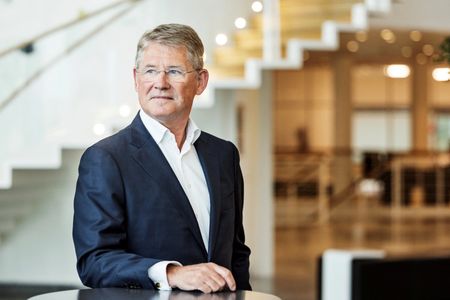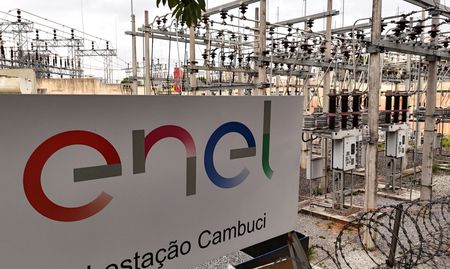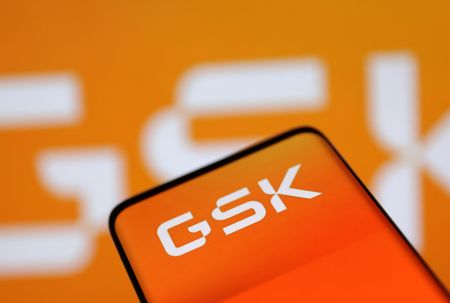By Jacob Gronholt-Pedersen and Maggie Fick
COPENHAGEN/LONDON (Reuters) -Years before Novo Nordisk’s obesity drug Wegovy became a U.S. blockbuster, then-CEO Lars Rebien Sorensen told a press conference in Copenhagen: “You ain’t seen nothing yet.”
More than a decade later, the 70-year-old is returning to Denmark’s biggest company and is expected to strongly influence its future direction – most immediately through the selection of a new chief executive.
His appointment as an observer on the board follows the removal on Friday of current CEO Lars Fruergaard Jorgensen by Novo and the Novo Nordisk Foundation – the company’s controlling shareholder, which Sorensen chairs.
Jorgensen succeeded Sorensen as CEO in 2017.
Six people interviewed by Reuters said they think Sorensen will use his influence to push for an external hire, the first in Novo’s 103-year history. The company has had only five chief executives, all Danes.
A source close to Novo who spoke on condition of anonymity said Sorensen would look for someone who could recharge the company’s U.S. performance, and that such a candidate was likely to come from outside.
Under Jorgensen’s leadership, Novo became a world leader in the lucrative weight-loss drug market, launching Wegovy in 2021. But in the United States, its largest and most profitable market, the drug has been struggling against U.S. rival Eli Lilly’s Zepbound.
The decision to remove Jorgensen showed the Foundation’s frustration with management over the execution of a strategy to shift Novo’s focus to obesity from diabetes care, devised when Sorensen was CEO, the same person said.
Novo Nordisk chair Helge Lund on Friday said the company’s strategy is unchanged despite the shake-up.
Lund said last week the search would include internal and external candidates and Jorgensen will stay on until a successor is appointed.
The Foundation declined to comment on Thursday.
A Novo Nordisk spokesperson said Sorensen will participate in board meetings but holds no voting rights as an observer. He will become a full board member at the next AGM.
NEW STYLE
Novo’s shares have more than halved from their peak when the company was valued at $615 billion in June last year, one reason cited by the Foundation for intervening to remove Jorgensen.
At one point Europe’s most valuable company, its expansion bolstered Denmark’s economy and the country’s global standing.
Nevertheless, Friday’s move stunned investors, analysts and many Danes, who viewed it as a public humiliation of Jorgensen and the company’s board.
The change of CEO also comes at a critical moment for the pharmaceutical industry as U.S. President Donald Trump threatens tariffs on pharmaceutical products and wants drugmakers to cut U.S. prices of brand-name medicines.
Financial analysts Reuters spoke to last week said an American chief executive might be better placed to deal with the Trump administration.
Investors and analysts do not see Sorensen himself – who during his 16 years in charge was twice named global CEO of the year by Harvard Business Review – as a candidate for the job.
When he stepped down as CEO in 2016, Novo cited as reasons increased competition in the U.S. market and pricing pressures for insulin, then its most profitable line.
But some people said Sorensen might want someone with a similar style to his own.
“He was very self-confident and a great communicator,” said Frank Horning Andersen, a former analyst at Jyske Bank who covered Novo during Sorensen’s tenure.
In contrast, Jorgensen, an economist by training, is a self-described introvert.
UNDER SCRUTINY
Pointing to “market challenges”, Sorensen said on Friday the “timing is right for a new profile as CEO of the company”.
Gareth Powell, head of healthcare at London-based investment fund Polar Capital, told Reuters the Foundation’s move to oust Jorgensen implied “a greater degree of scrutiny”.
“I think they need to be very careful going externally (for a CEO) because they’ve got to keep the pace up whilst they’re going through this process,” he said.
“But if they think they need to do something dramatic here, then maybe an external (hire) shakes things up.”
As CEO, Sorensen had his own clash with the Foundation, over plans in 2004 for a merger with Swiss-based drug company Serono that could have seen company headquarters moved to Switzerland.
The Foundation blocked the deal to preserve Novo’s Danish roots, according to Kurt Jacobsen, professor emeritus at Copenhagen Business School, who wrote a book about the company.
“Sorensen was furious,” Jacobsen said.
(Reporting by Maggie Fick in London and Jacob Gronholt-Pedersen and Stine Jacobsen in Copenhagen; Editing by Josephine Mason, Elaine Hardcastle and Catherine Evans)










